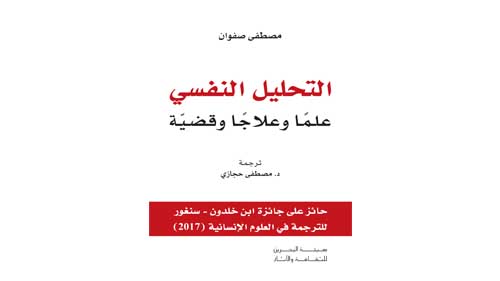12 March 2018
After Winning 2017 Ibn Khaldoun-Léopold Sédar Senghor Translation Award in Humanities, Transfer Knowledge Project Publishes " La psychanalyse : Science, thérapie - et cause”


Bahrain Authority for Culture & Antiquities’ Transfer of Knowledge project has just launched another the 2nd publication of a book titled “ La psychanalyse : Science, thérapie - et cause” by Egyptian psychoanalyst living in France. The book was translated by Dr. Mustapha Hijazi, who was the winner of 2017 Ibn Khaldoun-Léopold Sédar Senghor Translation Award in Humanities, which aims at promoting cultural and linguistic diversity as well as encouraging literary exchanges between the Arab and the Francophone worlds for his translation (from French into Arabic) of Dr. Mustapha Safwan’s book entitled : "La psychanalyse: Science, thérapie et cause”.
The translated book, issued within the Knowledge Transfer Project sponsored by the Bahrain Authority for Culture and Antiquities, offers an overview of the key elements of psychoanalysis, and thus serves as an valuable reference for researchers, students and all specialists in this field. The book traces the evolution of the psychoanalytical movement and highlights its key figures, particularly Sigmund Freud, Eugen Bleuler, and Jacques Lacan, along with other international researchers in psychoanalysis
The book adopts a scientific and critical approach that goes beyond the mere historical overviewing of theories and practices of psychotherapy; and here lies the importance of translating this book into Arabic, as it represents a valuable reference for students and researchers in this field.
The book deals with the unconscious world of humans and it is highly recommended to anyone who already knows a little Freud and wishes to gain some insight into Lacan’s ideas. In an elegantly straightforward way, Safouan deftly leads the reader through some of the most important concepts in Lacanian psychoanalysis. He cuts through numerous Gordian knots of complexity embedded in Lacan’s massive and difficult corpus, and, in so doing, succeeds in displaying the power and relevance of Lacanian theory as an unparalleled analysis of the nuances of psychical reality.
Worth to mention that “Becoming Virtual: Reality in the Digital Age” is the 18th publication presented by Knowledge Transfer Project. The first book was “ Think: A Compelling Introduction to Philosophy by Simon Blackburn”, “Did Greeks Believe in their Myths?” by the French intellectual Paul Veyne, and Maurice Olender, The Languages of Paradise: Race, Religion, and Philology in the Nineteenth Century”, and “ Psychoanalysis as a Science, Therapy and Cause” by the Egyptian psychoanalyst living in France, Mustapha Safwan. and “Non-Places: An Introduction to Supermodernity” by Marc Augé and Three ABCs by Clarisse Herrenschmidt, “The End of the World as We Know it” by the American Sociologist Immanuel Wallerstein, “The Story of Art” by Ernest Gombrich, “A Social History of the Media: From Gutenberg to the Internet” by n Asa Briggs and Peter Burke, “Einstein, Picasso: Space, Time, and the Beauty That Causes Havoc” by Arthur Miller, “The Content of the Form: Narrative Discourse and Historical Representation” by Hayden White, “ Ethnology Approach” by Pacal Debie, and “Non-Places: Introduction to an Anthropology of Supermodernity” by Marc Augé, Qu'est-ce que le virtuel ? by Pierre Levy, and “ Should We Think of the World in Another Way” by Chritian Gratello., and Faut-il vraiment découper l'histoire en tranches ? by Jacques Le goff







